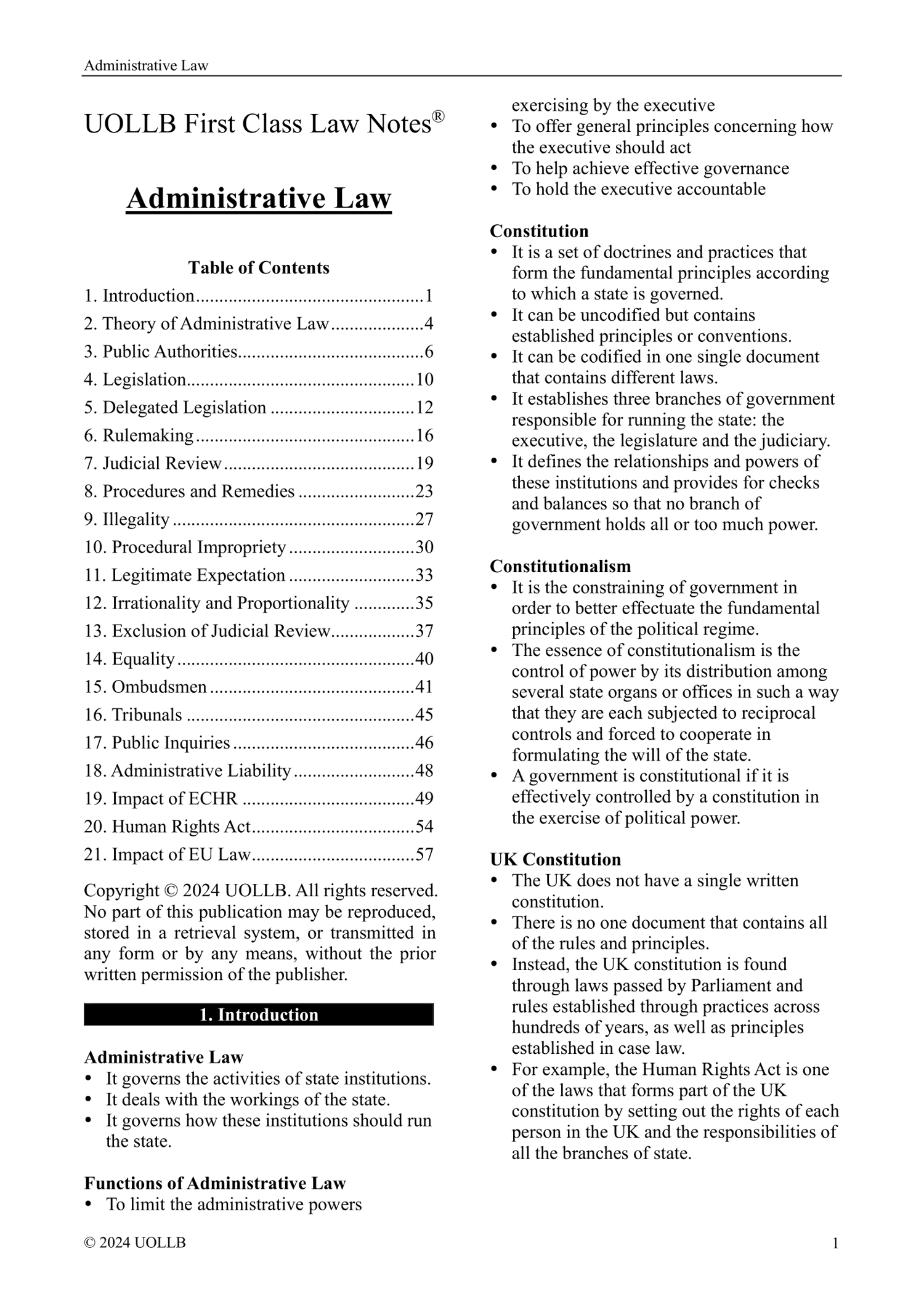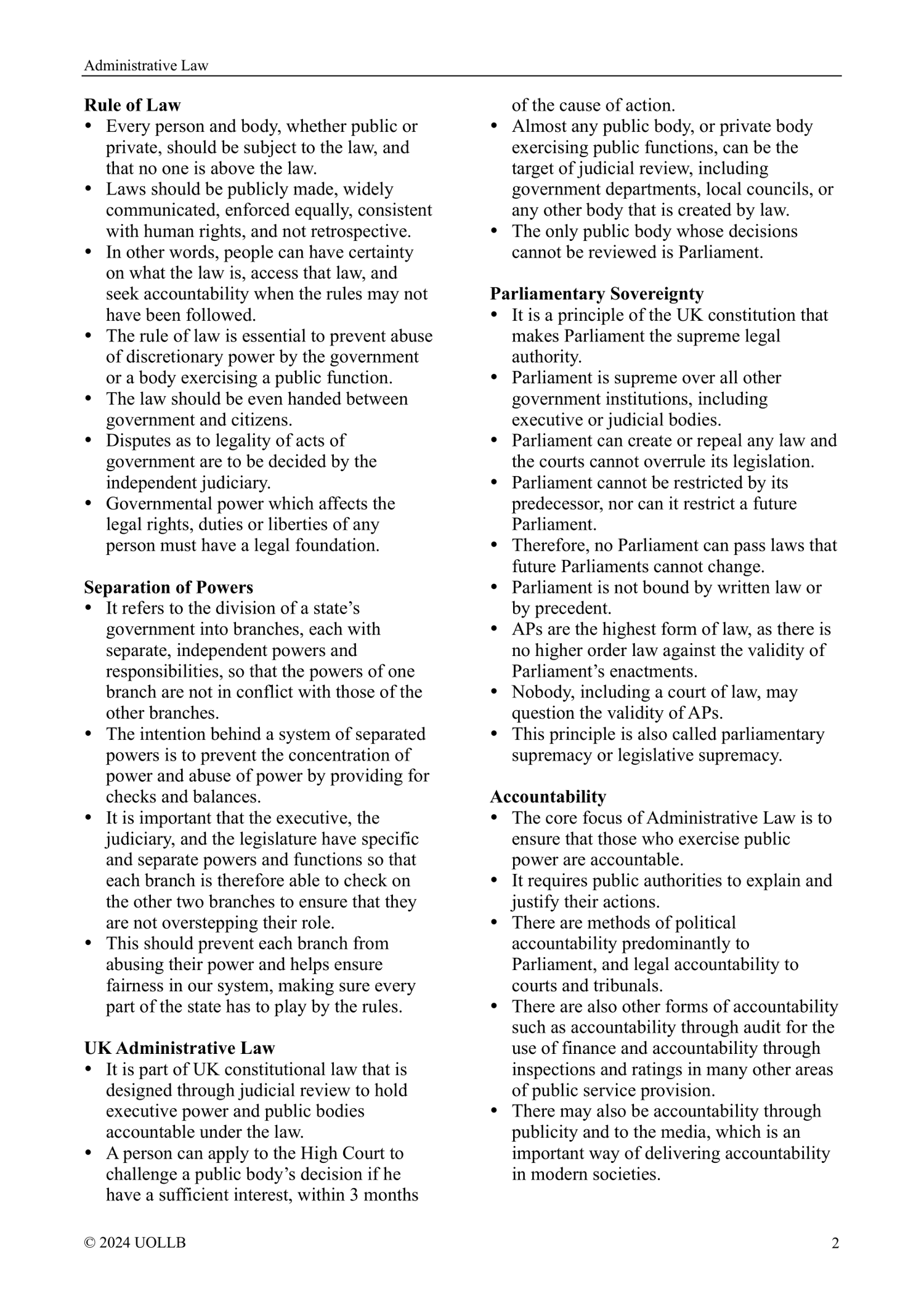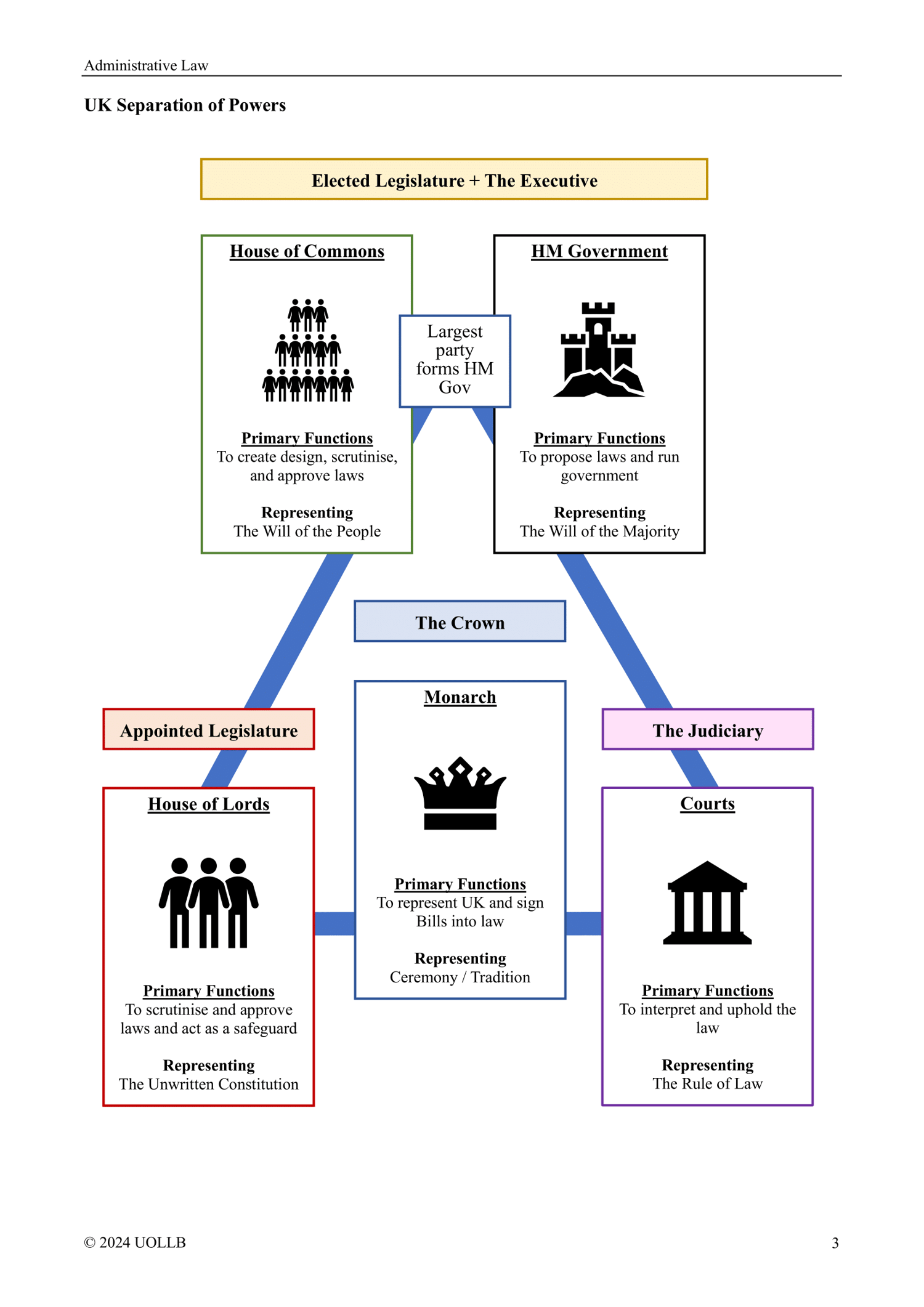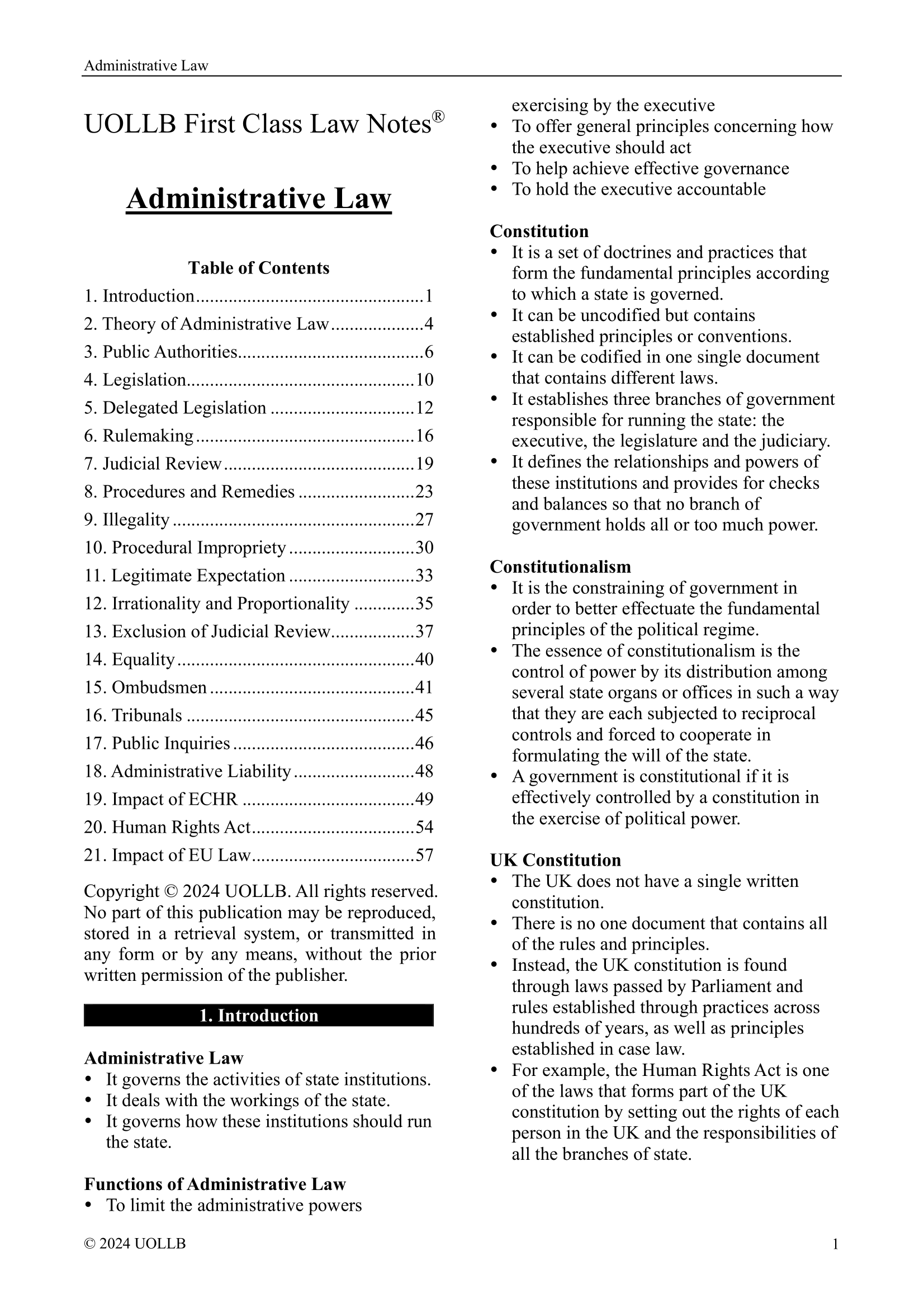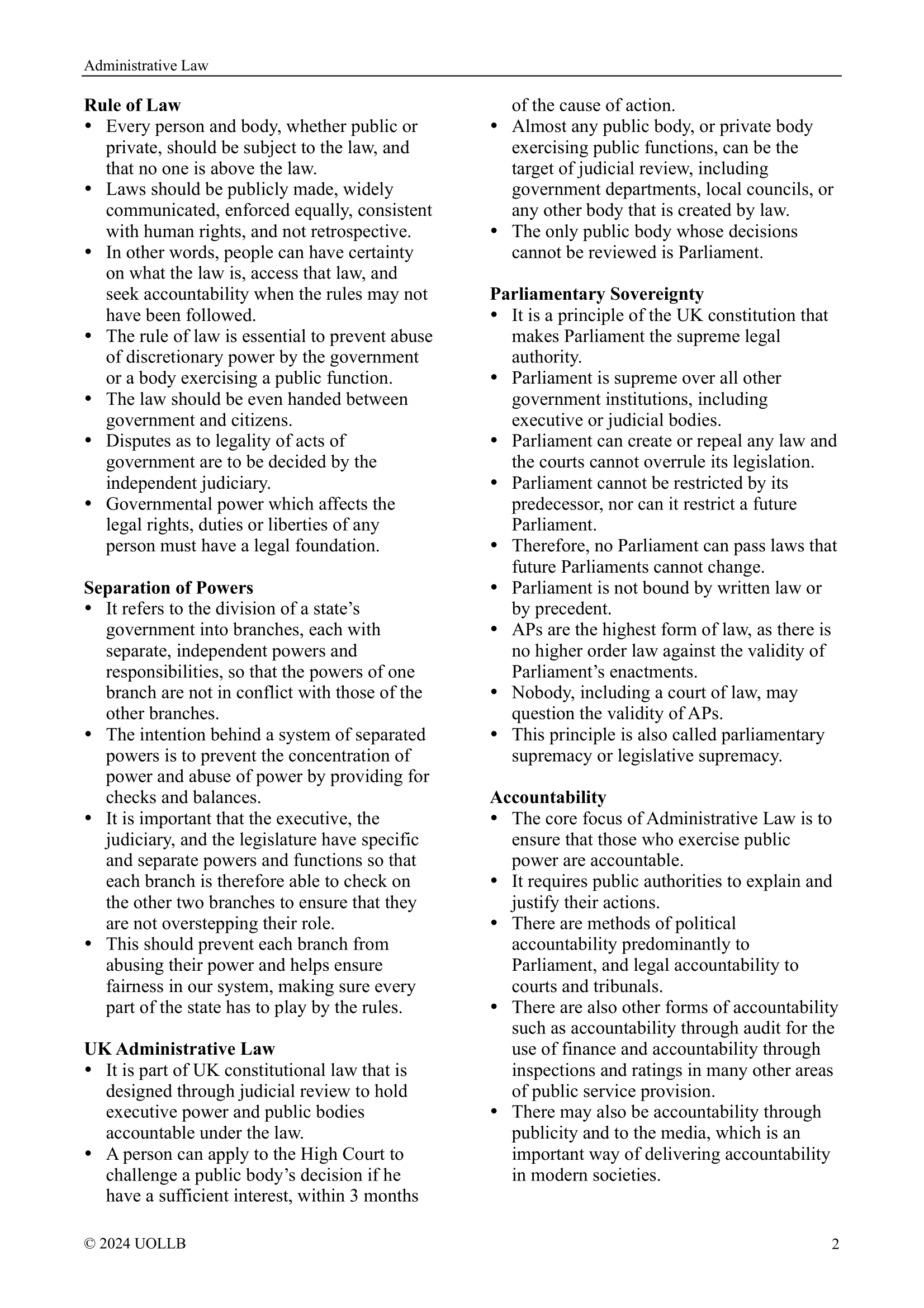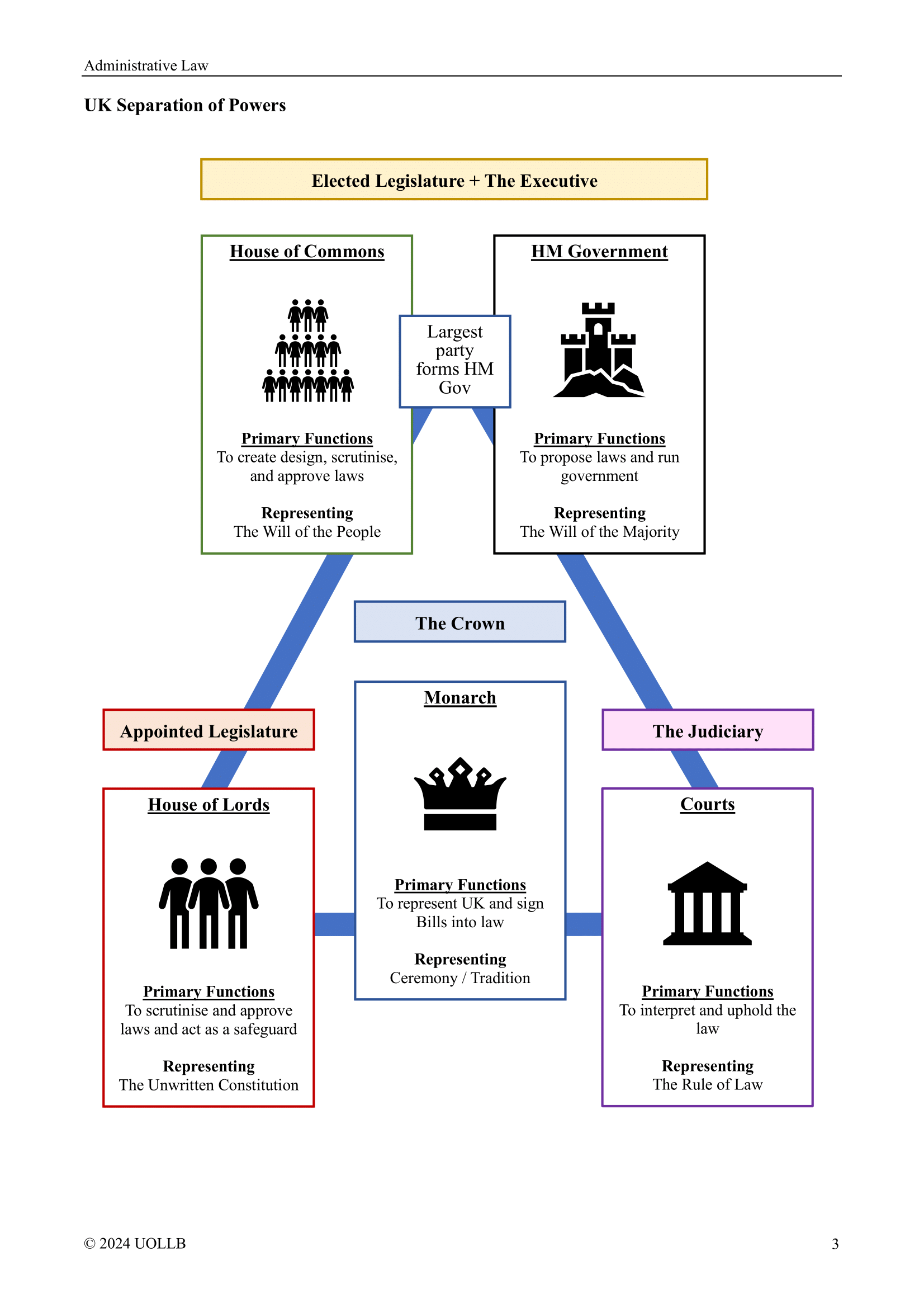Administrative Law focuses on the legal principles, rules, and procedures governing the actions and decisions of public bodies. You can select this module in Year 2. Although it is not required for entry into bar training, some topics, such as judicial review, are assessed in the SQE. Here is a summary of the topics covered in this module:
Definition of Administrative Law: Administrative law is a branch of public law that deals with the legal principles and rules governing administrative agencies and the relationship between these agencies, the government, and individuals or organisations affected by their decisions. It provides the legal framework within which administrative agencies operate, make decisions, and exercise their powers.
The Nature of Administrative Law: Administrative law focuses on the actions and decisions of administrative agencies, which are governmental bodies created by legislation to implement and administer specific laws and policies. These agencies are given powers and responsibilities to make and enforce regulations, issue licenses and permits, adjudicate disputes, and carry out various administrative functions. Administrative law governs the procedures, decision-making processes, and accountability of these agencies.
The Scope of Administrative Law: Administrative law covers a wide range of areas and activities, including:
- Administrative procedures: It regulates the procedures that administrative agencies must follow when making decisions, including requirements for notice, hearing, evidence, and appeals.
- Judicial review: Administrative law provides mechanisms for judicial review of administrative actions, allowing individuals or organisations affected by agency decisions to challenge their legality or fairness in court.
- Substantive administrative law: It deals with the substantive powers, duties, and functions of administrative agencies, including their rule-making authority, licensing and regulatory powers, and enforcement mechanisms.
- Administrative discretion: Administrative law addresses the scope and limits of administrative discretion, ensuring that agencies exercise their powers reasonably, fairly, and within the boundaries set by law.
- Accountability: It establishes mechanisms for holding administrative agencies accountable for their actions, including principles of transparency, accountability, and access to information.
The Legal Status of Administrative Authorities: Administrative authorities typically derive their legal status and powers from legislation enacted by the legislature. These statutes establish the purpose, functions, and powers of the administrative agencies, as well as the procedures they must follow. Administrative authorities are considered legal entities with the power to make decisions, issue orders or directives, and take actions within their authorised scope.
The Powers of Administrative Authorities: Administrative authorities are granted various powers to carry out their functions, which may include:
- Rule-making: Administrative agencies often have the power to create rules and regulations that have the force of law. These rules are called administrative regulations or subordinate legislation and are used to implement and enforce statutes.
- Adjudication: Administrative agencies may have quasi-judicial powers to resolve disputes and make decisions in specific areas, such as licensing, disciplinary actions, or disputes between parties regulated by the agency.
- Enforcement: Administrative authorities are typically vested with enforcement powers to ensure compliance with laws and regulations within their jurisdiction. This may include the power to conduct investigations, inspections, impose penalties, and take enforcement actions.
- Licensing and permits: Many administrative agencies have the authority to issue licenses, permits, certifications, or approvals in various fields, such as professional licensing, environmental permits, or business licenses.
The Crown: In constitutional and administrative law, the term Crown refers to the symbolic embodiment of the state and the source of governmental authority. It represents the monarch, who is the head of state, and is used to refer to the government as a whole. The Crown represents the executive branch of the government and exercises various powers and prerogatives.
Ministers: Ministers are individuals who hold ministerial positions in the government and are responsible for specific government departments or areas of policy. They are appointed by the head of state, typically on the advice of the Prime Minister or other relevant officials. Ministers play a key role in the formulation and implementation of government policies and are accountable for the administration of their respective ministries. They are responsible for making decisions, developing legislation, representing the government, and managing their department's activities.
Civil Service: The civil service refers to the body of permanent officials and employees who work within government departments and agencies. These individuals are responsible for implementing government policies, providing administrative support, and delivering public services. Civil servants are employed based on merit and are expected to be politically neutral, serving the government of the day regardless of political affiliations. They provide continuity and expertise in the administration of government and work under the direction of ministers to carry out their policy objectives.
Executive Agencies: Executive agencies are bodies established by the government to carry out specific functions or deliver specific services on behalf of the government. These agencies operate separately from government departments but are accountable to them and are subject to government oversight. They are typically given a degree of operational independence and have their own management structures and budgets. Executive agencies can have specific areas of expertise and responsibility, such as healthcare, education, transportation, or law enforcement.
Local Authorities: Local authorities, also known as local governments or local councils, are administrative bodies at the local level that have powers and responsibilities within a defined geographic area. They are responsible for delivering public services and representing the interests of the local community. Local authorities vary in their structure and powers depending on the country and jurisdiction, but they typically have the authority to make decisions and implement policies on matters such as planning and zoning, public transportation, waste management, social services, and local infrastructure. Local authorities are headed by elected officials, such as mayors or councillors, who are responsible for making decisions on behalf of the local community.
Regulatory Agencies: Regulatory agencies are specialised bodies established by the government to oversee and regulate specific industries or sectors. These agencies are responsible for enforcing laws, regulations, and standards to ensure compliance and protect the public interest. Regulatory agencies have the authority to issue licenses, permits, and certifications, conduct inspections, investigate complaints, and impose sanctions or penalties for non-compliance. Examples of regulatory agencies include the Food and Drug Administration (FDA), the Environmental Protection Agency (EPA), and the Financial Conduct Authority (FCA).
Other Public Authorities:
In addition to regulatory agencies, there are various other public authorities that exist to perform specific functions or provide specific services. These authorities can have a wide range of roles and responsibilities, depending on the jurisdiction. Examples include educational authorities overseeing schools and universities, transportation authorities managing public transportation systems, and housing authorities responsible for affordable housing initiatives. These authorities operate under the direction and supervision of the government and are accountable for fulfilling their designated mandates.
The National Health Service (NHS):
The National Health Service (NHS) is a publicly funded healthcare system in the United Kingdom. It provides comprehensive healthcare services, including medical treatment, preventive care, and emergency services, to residents of the UK. The NHS is funded through general taxation and offers healthcare services that are free at the point of delivery. It is administered by various bodies, including the Department of Health and Social Care, NHS England, and local NHS Trusts. The NHS plays a vital role in ensuring access to healthcare for all citizens and is one of the largest employers in the UK.
Processes in Public Administration: Public administration refers to the implementation and management of government policies, programs, and services. It involves various processes that enable the functioning of public authorities and the delivery of public services. These processes can include:
- Policy development: The formulation of policies and strategies to address public issues, set goals, and guide decision-making.
- Budgeting and financial management: The allocation and management of public funds to support government activities and public service delivery.
- Human resource management: Recruitment, training, and management of employees within public authorities to ensure efficient and effective service delivery.
- Procurement and contract management: The acquisition of goods and services required by public authorities through competitive processes, ensuring transparency, fairness, and value for money.
- Service delivery and performance monitoring: The implementation of public programs and services, monitoring their performance, and evaluating their effectiveness in meeting objectives.
Legislation: Legislation refers to the process of making laws or statutes that govern a particular jurisdiction. Legislation is the primary source of law and is created by the legislative branch of government, which may be a parliament, congress, or similar legislative body. Legislation sets out rules, rights, obligations, and procedures that individuals, organisations, and government entities must follow. It covers a wide range of areas, including criminal law, civil law, administrative law, and regulatory matters. Legislation is binding and enforceable, and violations can result in legal consequences.
Primary Legislation: Primary legislation, also known as statute law or primary law, is the highest form of legislation in a legal system. It is enacted by the legislative body and constitutes the fundamental laws that govern a jurisdiction. Primary legislation is usually in the form of acts or statutes and covers significant and comprehensive areas of law. It is drafted, debated, and approved by the legislative body through a formal legislative process, which may involve multiple readings, committee reviews, and voting. Examples of primary legislation include constitutional laws, criminal codes, and major statutes governing various sectors of society.
Delegated Legislation: Delegated legislation, also known as subordinate legislation or secondary legislation, refers to laws or regulations made by individuals or bodies other than the legislature, but with the authority derived from primary legislation. Delegated legislation is created to provide detailed rules, regulations, and procedures within the framework set by the primary legislation. It allows the government or authorised entities to address specific issues, make changes, or provide additional guidance without requiring the lengthy process of enacting primary legislation.
Discretion: Discretion refers to the power or authority granted to administrative authorities or decision-makers to make choices or decisions within a legal framework. It allows them to exercise judgment and make decisions based on the specific circumstances of a case or situation. Discretionary powers are typically granted to administrative authorities to enable them to address individual cases or unique circumstances that may not be covered by rigid rules or regulations. However, the exercise of discretion must be within the limits set by law and guided by principles of fairness, reasonableness, and consistency.
Rule-making: Rule-making is the process by which administrative authorities create and establish rules and regulations that have the force of law. These rules are designed to provide guidance and govern the conduct of individuals, organisations, or entities within a particular jurisdiction or under the authority of the administrative agency. Rule-making involves formulating, drafting, and publishing regulations, which may involve consultation with stakeholders, public input, and adherence to prescribed procedures. The rules created through this process serve to clarify legal requirements, establish standards, and provide a framework for consistent decision-making and enforcement.
Policies: Policies are guidelines or principles adopted by administrative authorities to guide their decision-making and actions. Policies provide a framework for consistency and predictability in administrative decision-making and help achieve specific objectives or outcomes. Policies are often developed to address broad issues or goals, and they provide guidance to administrative authorities when making discretionary decisions or implementing regulations. Policies can cover various areas, such as public health, environmental protection, employment, or education, and they may be subject to periodic review and revision to adapt to changing circumstances or priorities.
Adjudication: Adjudication refers to the process by which administrative authorities resolve disputes, make decisions, or hear and decide on individual cases. Administrative adjudication is a quasi-judicial process that involves the examination of evidence, interpretation of law or regulations, and the rendering of decisions or judgments by administrative tribunals or panels. Administrative authorities with adjudicative powers conduct hearings, consider arguments and evidence presented by the parties involved, and issue decisions or orders based on the facts and legal principles applicable to the case. Adjudication provides an avenue for individuals or organisations to challenge administrative decisions or seek remedies in a fair and impartial manner.
Consultation: Consultation is the process of seeking input, feedback, or advice from stakeholders, interested parties, or the public on matters related to administrative decision-making, rule-making, or policy development. It involves actively engaging and involving individuals, organisations, or affected communities in the decision-making process to ensure that their perspectives and concerns are considered. Consultation can take various forms, such as public meetings, surveys, written submissions, or stakeholder discussions. It helps to promote transparency, accountability, and legitimacy in administrative decision-making, and it allows for a more inclusive and informed process.
Allocation of Functions: The allocation of functions refers to the assignment or distribution of specific responsibilities, tasks, or functions to different administrative authorities or bodies within a government structure. It involves determining which authority or agency is responsible for carrying out particular functions or tasks based on their expertise, mandate, or legal authority. The allocation of functions ensures that different aspects of governance, regulation, or service delivery are appropriately assigned to the relevant administrative bodies. This allocation may be based on factors such as efficiency, effectiveness, expertise, or accountability, and it helps to establish clear lines of responsibility and coordination within the administrative framework.
Meaning of Judicial Review: Judicial review is a legal process through which a court examines the lawfulness of administrative actions, decisions, or omissions of public authorities. It involves a review of the legality, fairness, and procedural correctness of administrative acts to ensure they comply with the principles of administrative law. Judicial review allows individuals or organisations to challenge the exercise of public power and seek remedies if it is found to be unlawful or unfair.
The Function of Judicial Review: The function of judicial review is to act as a check on the actions of public authorities to ensure they act within the limits of their legal powers and in accordance with the principles of administrative law. It serves several purposes:
- Upholding the rule of law: Judicial review ensures that government actions are subject to legal scrutiny, preventing abuse of power and maintaining the rule of law.
- Protecting individual rights: It safeguards the rights and interests of individuals or organisations affected by administrative decisions, ensuring fairness, reasonableness, and legality.
- Maintaining accountability: Judicial review holds public authorities accountable for their actions by providing a mechanism to challenge their decisions and seek remedies if they act unlawfully or unfairly.
- Ensuring compliance with legal procedures: It ensures that administrative actions follow proper procedures, such as consultation, fair hearings, and adherence to the principles of natural justice.
Procedures of Judicial Review: The procedures of judicial review refer to the legal process through which a court reviews the lawfulness of administrative actions or decisions. The specific procedures may vary depending on the jurisdiction, but they generally involve the following key steps:
- Permission / Application: The individual or entity seeking judicial review must typically apply to the court for permission to proceed with the review. This application may involve submitting a claim form or application outlining the grounds for review and the relief sought.
- Pre-action protocol: In some cases, there may be a requirement to engage in pre-action correspondence or negotiations with the administrative authority before commencing formal judicial review proceedings. This aims to encourage settlement or clarification of issues before going to court.
- Claim form and statement of grounds: The claimant files a claim form with the court, setting out the details of the case, including the administrative decision being challenged, the legal basis for the challenge, and the relief sought. The claimant is also required to provide a detailed statement of grounds explaining the specific legal grounds for the challenge.
- Acknowledgment of service: The administrative authority or defendant typically files an acknowledgment of service, indicating whether it contests the claim and may provide a summary of its response to the claim.
- Hearing and submissions: The court will schedule a hearing to consider the judicial review application. Both parties have the opportunity to present their arguments and evidence supporting their respective positions. The court will consider the legal arguments, the evidence, and relevant case law in reaching its decision.
- Judgment: The court will deliver its judgment, determining whether the administrative action or decision was lawful or unlawful. If the court finds the administrative action to be unlawful, it may quash or invalidate the decision, and it may provide further directions or remedies.
Remedies of Judicial Review: Remedies available in judicial review proceedings aim to address the unlawfulness of the administrative action or decision. The specific remedies that may be granted by the court can vary depending on the circumstances and the jurisdiction, but common remedies include:
- Quashing order: This remedy nullifies the administrative decision or action, effectively rendering it void and of no legal effect.
- Prohibiting order: This remedy prevents an administrative authority from taking a particular action or making a specific decision.
- Mandatory order: This remedy compels the administrative authority to take a specific action or make a particular decision.
- Declaration: The court may issue a declaration stating the rights and legal position of the parties involved in the judicial review.
- Injunction: In some cases, the court may grant an interim or final injunction to prevent or restrain certain actions pending the outcome of the judicial review.
- Damages: In certain circumstances, the court may award damages to compensate the claimant for any losses or harm suffered as a result of the unlawful administrative action.
Administrative Action under Section 31 Senior Courts Act 1981: Section 31 of the Senior Courts Act 1981 in the United Kingdom grants the High Court the power to hear claims for judicial review and determine the lawfulness of administrative actions or decisions. It sets out the jurisdiction and authority of the court to hear and determine such cases.
Administrative Action under Part 54 of the Civil Procedure Rules: Part 54 of the Civil Procedure Rules (CPR) in the United Kingdom sets out the specific rules and procedures for bringing a claim for judicial review in the Administrative Court. It provides guidance on various aspects of judicial review proceedings, including the requirements for initiating a claim, service of documents, evidence, hearing, and remedies.
Grounds for Judicial Review: Grounds for judicial review are the legal principles or grounds on which a court can review the lawfulness of administrative actions or decisions. These grounds provide a basis for individuals or organisations to challenge the exercise of public power. Common grounds for judicial review include illegality, procedural impropriety, irrationality, and legitimate expectation.
Illegality: Illegality is one of the grounds for judicial review. It refers to situations where the administrative action or decision is beyond the legal authority of the public authority, contrary to law, or in violation of the legal framework governing the exercise of its powers. An action may be considered illegal if it exceeds the powers granted by legislation, if it is ultra vires (beyond the authority), or if it contradicts the principles and requirements of the relevant legal framework.
Procedural Impropriety: Procedural impropriety is another ground for judicial review. It arises when there has been a failure to follow the proper procedures required by law or the principles of natural justice. This may include failure to provide adequate notice, lack of fair hearing, bias, improper delegation of powers, or a failure to consult when required. Procedural impropriety focuses on the fairness and correctness of the procedures followed in making an administrative decision.
Irrationality: Irrationality, also known as Wednesbury unreasonableness, is a ground for judicial review based on the principle that an administrative decision should not be so unreasonable that no reasonable authority would have reached it. It involves assessing whether the decision is so irrational, illogical, or absurd that it goes beyond the bounds of reasonableness.
Legitimate Expectation: Legitimate expectation is a ground for judicial review that arises when an individual or organisation has a reasonable expectation that a public authority will act in a certain way based on a promise, representation, or consistent past practice. If a public authority fails to meet that expectation without a valid reason, it may be subject to judicial review. The court will assess whether the expectation is legitimate, whether it has been clearly established, and whether there are sufficient grounds to interfere with the decision based on the breach of the legitimate expectation.
The Development of the Grounds for Judicial Review: The grounds for judicial review have evolved and developed over time through case law and statutory reforms. Courts have interpreted and expanded the grounds based on legal principles, constitutional considerations, and societal expectations of accountability and fairness. The development of these grounds reflects the courts' role in balancing the exercise of public power with the protection of individual rights and the rule of law.
Exclusion of Judicial Review: While judicial review provides an essential mechanism for holding public authorities accountable, there are certain instances where judicial review may be excluded or limited. Exclusion can occur through statutory provisions, where specific legislation expressly excludes or limits the availability of judicial review in certain areas or for certain decisions. Additionally, some administrative actions or decisions may be considered non-justiciable, meaning they are outside the scope of review by the courts due to constitutional or policy reasons.
Ombudsmen: Ombudsmen are independent public officials who investigate complaints against government bodies, organisations, or public services. They aim to ensure that administrative actions are fair, transparent, and accountable. Ombudsmen provide an avenue for individuals to seek redress when they believe they have been treated unfairly or have encountered maladministration. In the UK, various ombudsmen operate at different levels and sectors to address specific areas of concern.
The Parliamentary Commissioner for Administration: The Parliamentary Commissioner for Administration, commonly known as the Parliamentary Ombudsman, is an independent officer appointed by the UK Parliament. The ombudsman's role is to investigate complaints of maladministration by UK government departments, agencies, and other public bodies. The Parliamentary Ombudsman mainly focuses on cases involving injustice resulting from administrative errors or failure to follow proper procedures.
The Health Service Commissioner: The Health Service Commissioner, also known as the Health Service Ombudsman, is responsible for investigating complaints related to the National Health Service (NHS) in England. The ombudsman examines cases where individuals have experienced poor healthcare, maladministration, or violation of rights within the NHS. Its investigations aim to bring about improvements in the delivery of healthcare services and hold the NHS accountable for its actions.
The Local Commissioners for Administration: The Local Commissioners for Administration, also referred to as Local Government Ombudsmen, are independent bodies that investigate complaints regarding local government authorities in England. These ombudsmen handle complaints related to issues such as housing, planning, social care, education, and other services provided by local councils. They ensure that local government bodies operate fairly, ethically, and in compliance with applicable laws and regulations.
Tribunals: Tribunals are specialised bodies established by law to resolve disputes and make decisions on specific areas of law. They operate outside of the regular court system and are designed to provide a more accessible, efficient, and specialised form of justice. Tribunals cover a wide range of areas, such as employment, immigration, social security, tax, planning, and housing.
The Function of Tribunals: The primary function of tribunals is to adjudicate disputes and make decisions on matters within their jurisdiction. They provide a forum for individuals, organisations, and government bodies to have their cases heard and resolved by expert tribunal members or judges. Tribunals aim to ensure fairness, impartiality, and expertise in decision-making, taking into account the specific legal framework and policies of the area they cover.
Constitution of Tribunals: The constitution of tribunals varies depending on the jurisdiction and the specific area of law they deal with. Generally, tribunals consist of tribunal members or judges who have expertise in the relevant field. In some cases, the tribunal may be composed of a single member, while in others, there may be a panel of members. Tribunal members are often appointed based on their knowledge, experience, and expertise in the subject matter of the tribunal.
Procedure of Tribunals: Tribunals have their own procedural rules and guidelines, which govern the conduct of proceedings before them. The specific procedures may differ between different tribunals, but they generally aim to provide a less formal and more accessible process compared to traditional court proceedings. Some key features of tribunal procedures include:
- Informality: Tribunals typically adopt a less formal approach compared to courts, allowing parties to present their cases in a less adversarial setting.
- Accessibility: Tribunals strive to be accessible to individuals who may not be legally represented. They often provide assistance and support to help individuals navigate the process.
- Expertise: Tribunal members are chosen for their knowledge and expertise in the subject matter, ensuring that decisions are made by individuals with specialised knowledge in the relevant field.
- Speed and efficiency: Tribunals aim to resolve disputes in a timely and efficient manner. They often have streamlined processes to avoid unnecessary delays.
- Oral hearings: Many tribunal proceedings involve oral hearings, where parties have the opportunity to present their arguments and evidence before the tribunal.
- Decisions and remedies: Tribunals have the power to make decisions and issue remedies based on their findings. The decisions of tribunals are usually binding and can be enforced in the same way as court judgments.
Public Inquiries: Public inquiries are formal investigations established by the government or other public authorities to examine specific matters of public concern. They are independent and objective processes conducted by a panel or an individual, often referred to as an inquiry chair or commissioner. Public inquiries are designed to gather evidence, hear testimonies from witnesses, and produce a report with findings and recommendations.
The Origin of Public Inquiries: Public inquiries have a long history and can be traced back to ancient times. The practice of appointing independent individuals or bodies to investigate and report on matters of public interest emerged as a means to ensure transparency, accountability, and public confidence in the decision-making process. Inquiries gained prominence as a response to major incidents, disasters, or controversies that required thorough examination and public scrutiny.
The Function of Public Inquiries: The primary function of public inquiries is to examine and investigate issues of public concern in an impartial and transparent manner. They are established to (1) determine the facts and circumstances surrounding a specific event, incident, or controversy, (2) identify any failures, errors, or misconduct that may have contributed to the event or controversy, (3) make findings and recommendations to prevent similar incidents in the future, (4) provide an opportunity for affected individuals and organisations to present evidence, share their experiences, and have their voices heard, and (5) enhance public trust and confidence by demonstrating that the matter is being thoroughly examined by an independent and objective body.
Public Local Inquiries in Relation to Land-Use Control: Public local inquiries are a specific type of public inquiry that focuses on matters related to land-use control and planning. These inquiries are conducted to determine planning applications, appeals against planning decisions, or to examine disputes and controversies related to land-use planning and development. They involve gathering evidence from relevant parties, listening to testimonies, and considering expert opinions to make informed decisions on land-use matters.
Other Types of Inquiries: In addition to public local inquiries, there are various other types of inquiries that may be established depending on the nature of the issue or event. Some examples include:
- Statutory inquiries: These are inquiries established by legislation to investigate specific areas, such as public safety, healthcare, or financial misconduct.
- Royal commissions: Royal Commissions are independent inquiries appointed by the monarch or the government to investigate matters of significant national importance. They are typically used for complex or controversial issues that require in-depth examination and recommendations.
- Independent inquiries: These inquiries are set up to investigate specific matters that may not fall within the scope of statutory or royal commission inquiries. They are often established to examine matters of public interest, such as government policies, public service failures, or systemic issues.
Contractual Liabilities of Public Bodies: Public bodies, including government departments, local authorities, and public agencies, can enter into contracts like any other legal entity. They may be liable for breach of contract if they fail to fulfil their contractual obligations. The contractual liabilities of public bodies are generally governed by the same principles that apply to contracts between private individuals or entities. However, there may be specific statutory provisions or contractual terms that govern the liability of public bodies.
Tort Liabilities of Public Bodies: Public bodies can also be held liable in tort for their actions or omissions that cause harm or damage to individuals or property. The tort liabilities of public bodies are based on the general principles of tort law, such as negligence, nuisance, trespass, or misfeasance in public office. To establish tort liability, the claimant must prove that the public body owed them a duty of care, breached that duty, and that the breach resulted in foreseeable harm or loss.
Duties of Public Bodies: Public bodies have various duties and responsibilities depending on their nature and functions. Some common duties of public bodies include:
- Statutory duties: Public bodies are often created by legislation, which sets out their specific duties and powers. They are required to comply with these statutory obligations.
- Duty to act in the public interest: Public bodies are generally expected to act in the best interest of the public and fulfil their statutory mandates to promote the welfare and well-being of the community.
- Duty of care: Public bodies may owe a duty of care to individuals or groups who may be affected by their actions or decisions. This duty requires them to exercise reasonable care and skill in carrying out their functions.
- Duty to exercise discretion properly: Public bodies that have discretionary powers must exercise their discretion lawfully, fairly, and in accordance with relevant legal principles.
Restitution: Restitution is a legal remedy that aims to restore a person to the position he was in before suffering a loss or unjust enrichment. It allows a claimant to recover property, money, or benefits that he has lost as a result of the defendant's actions or wrongdoing. Restitution can be sought against public bodies in cases where they have been unjustly enriched or have obtained a benefit at the claimant's expense.
Crown Proceedings Act 1947: The Crown Proceedings Act 1947 is a UK legislation that governs the civil liability of the Crown (i.e. the government) and certain public bodies. It provides a statutory framework for individuals to bring legal proceedings against the Crown in the same manner as they would against any other legal person. The Act allows individuals to sue the Crown for breaches of contract, torts, or other civil wrongs. It sets out procedures, limitations, and exemptions applicable to such proceedings.
The Impact of the European Convention of Human Rights on English Administrative Law: The European Convention of Human Rights, which was adopted by the Council of Europe in 1950, has had a significant impact on English administrative law. The Human Rights Act 1998 incorporated the rights and freedoms enshrined in the ECHR into UK domestic law. As a result, public authorities, including administrative bodies, are required to act in a manner that is compatible with the rights and freedoms protected under the ECHR. The incorporation of the ECHR into domestic law has led to changes in the approach to administrative decision-making and the judicial review of administrative actions. The courts now have the power to scrutinise administrative decisions for potential violations of ECHR rights, such as the right to a fair trial, the right to privacy, freedom of expression, and freedom from torture and inhuman or degrading treatment. This has expanded the grounds on which administrative decisions can be challenged and has led to a greater emphasis on human rights considerations in administrative law cases.
The Impact of EU Law on English Administrative Law: Prior to the UK's withdrawal from the European Union, EU law had a significant impact on English administrative law. EU law consists of treaties, directives, and regulations that are binding on member states. It has influenced various areas of administrative law, particularly in relation to the principle of supremacy of EU law and the free movement of goods, services, capital, and persons within the EU. EU law has introduced important principles and concepts that have affected administrative law in the UK. For example, the principle of proportionality, which requires that administrative actions be proportionate to their objectives, has been influenced by EU law. The principle of non-discrimination and the concept of direct effect, which allows individuals to rely on certain EU law provisions directly in national courts, have also had an impact on English administrative law.
Administrative Law explores the relationship between individuals and the government or public bodies, and the mechanisms for holding administrative authorities accountable for their actions. This module equips you with the knowledge and analytical skills necessary to navigate complex administrative processes, challenge administrative decisions, and uphold principles of fairness, accountability, and the rule of law.
You can learn more about each topic and relevant case law with our exam-focused Administrative Law notes.






















